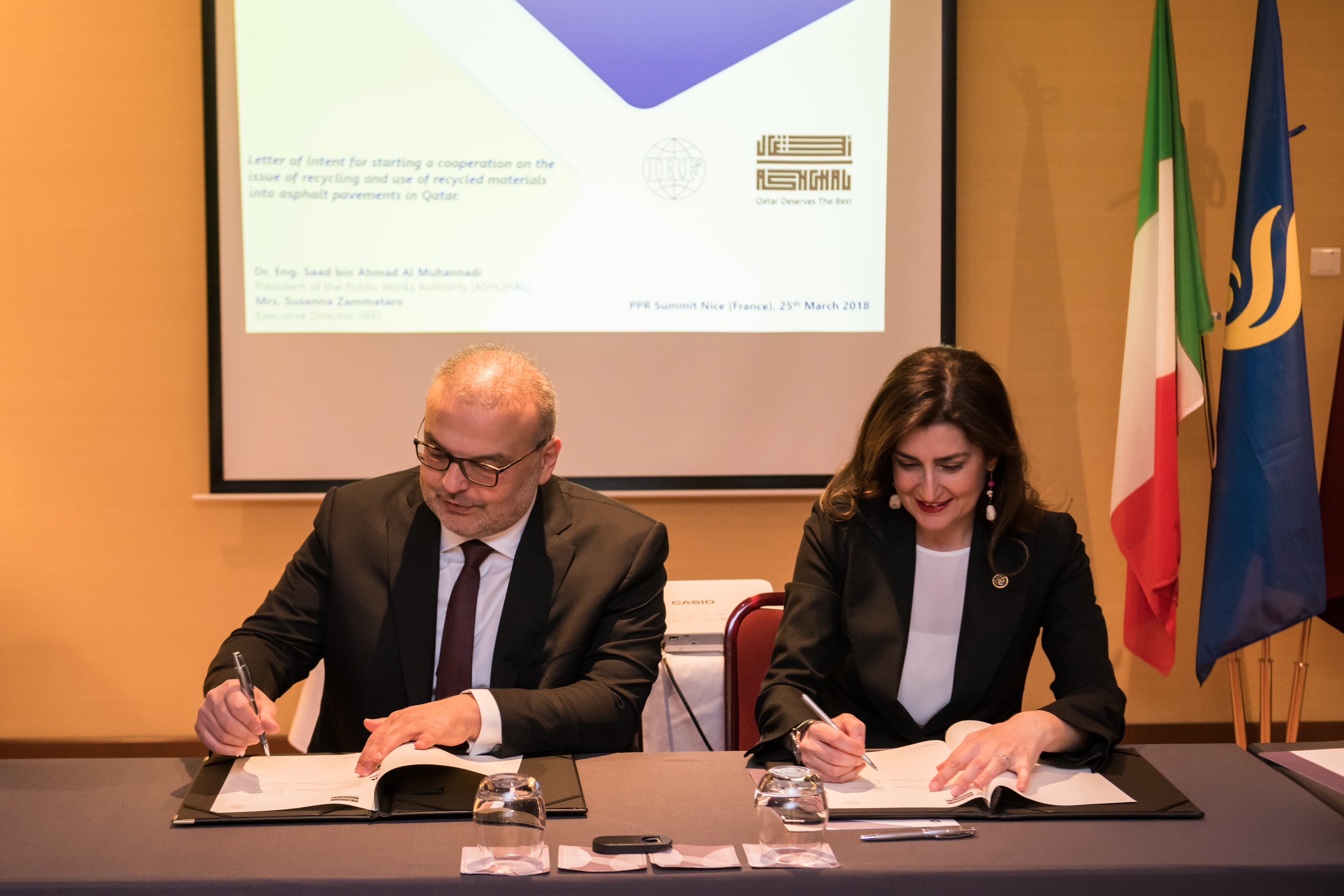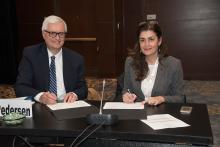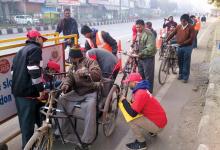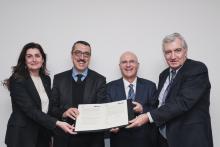
The Pavement Preservation and Recycling Summit (PPRS) 2018 in Nice (26th – 28th March 2018) set the scene for the signature of an important Memorandum of Understanding (MoU) between between
Ashghal’s delegation, made up of a group of senior officials was headed by HE Dr Eng Saad bin Ahmed Al-Muhannadi, president of the Public Works Authority. Ashghal has planned to recycle 3 million tonnes of asphalt waste over the next two years and is working with its partners to increase the proportion of recycled materials and use them in projects in a range of 15 - 50%, to be included with the specifications of QCS 2018. The MoU signed by Ashghal’s president Dr Eng Saad Al-Muhannadi and Susanna Zammataro, executive director of International Road Federation (Geneva) aims at boosting cooperation in the field of construction recycling. “We are delighted to support Qatar in the implementation of its national strategy 2017-2022. IRF’s expertise and network will provide an extra gear to the ambitious plan set by Ashghal,” said Zammataro.
The National Strategy 2017-2022 of the State of Qatar aims: 1. at ensuring that at least 20% of recycled materials is used in road construction projects 2. a reduction of 30% for the cost of raw materials used in road construction in Qatar and 3. a greater uptake of environment friendly methods and techniques in the construction sector, in line with Qatar National Vision 2030 for sustainability.
Ashghal's engagement to promote recycling of construction materials looks at facilitating the establishment of a platform for the development of sustainable local infrastructure and reduce the volume of import of aggregates and bitumen from abroad. This will of course have the effect of reducing costs and improve on time project delivery. The signature of the MoU between Ashghal and IRF was also followed by the signature of an MoU between Ashghal and Anas Qatar Branch, who since 2012 works in Qatar to develop a Quality Assurance/Quality Control system for road pavements. The MoU marks the start of the e-library to be created by ANAS on Ashghal’s web portal to offer access to technical knowledge in the field of civil engineering, standards and technical specifications.
IRF India enhancing conspicuity of tractor trailers in Uttar Pradesh
Tractors, often with attached trailers are, in most parts of India, increasingly replacing other modes of rural transport of agricultural produce to primary markets. It is estimated that around 65% of farm produce arriving in primary markets is accounted for by tractor trailers. Tractors are a highly vulnerable mode of transport. Farm machinery incident data collected during a survey of seven Indian states has established that the highest number of such crashes involved tractor and tractor-operated implements. Among the total fatalities attributed to farm machinery incidents, tractors and tractor trailers accounted for 44%, according to the same study.
Poor visibility or lack of visibility, due to unfavourable weather conditions or travel during the dark hours, is a major cause of tractor crashes. With its long history of providing conspicuity to over 2,000,000 bicycles and bicycles users, another highly vulnerable road user segment, IRF India, through this novel collaborative venture with Indian Potash, a leading fertiliser corporate in the country, has now taken a small but significant step towards improving safety for the vast unprotected number of tractor trailers operating in the rural area. This initiative, undertaken with the generous CSR fund support of Indian Potash Limited, has enabled IRF to cover 2,000 tractor trailers of cane farmers in 6 IPL owned sugar units in the northern state of Uttar Pradesh with high-quality 3M retro-reflective tapes. The colour and placement specifications of tapes were worked out in an earlier rigorous exercise by IRF India in consultation with the Bureau of Indian Standards, which sets the standards for the use of retro-reflective tapes in India’s automobile industry. A dedicated Team of five applicators, supervised by an IRF representative, completed the exercise of affixing retro-reflective tapes on tractor trailers in a record time in the six targeted units. The six units covered have a total processing capacity of around 22,000tonnes of sugarcane crushing/day. IRF India has plans to take this initiative forward in a Mission mode, with the support of other stakeholders of the rural farm sector, to cover the large tractor population of the country’s vast rural hinterland.









